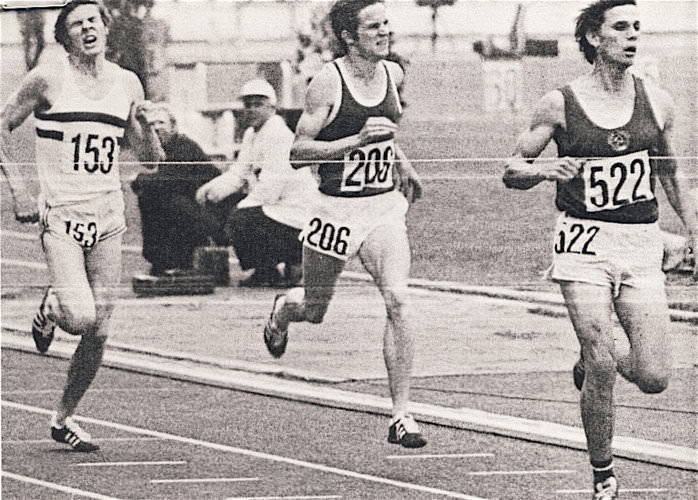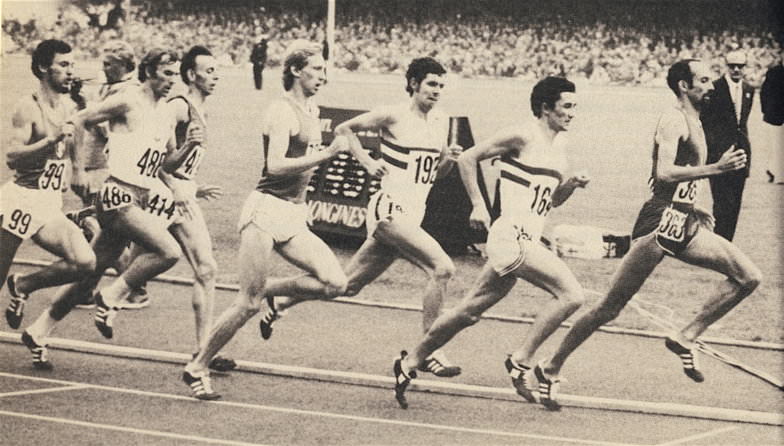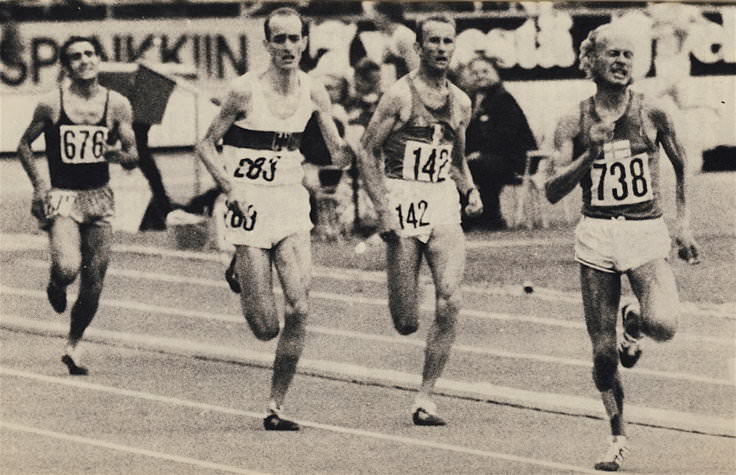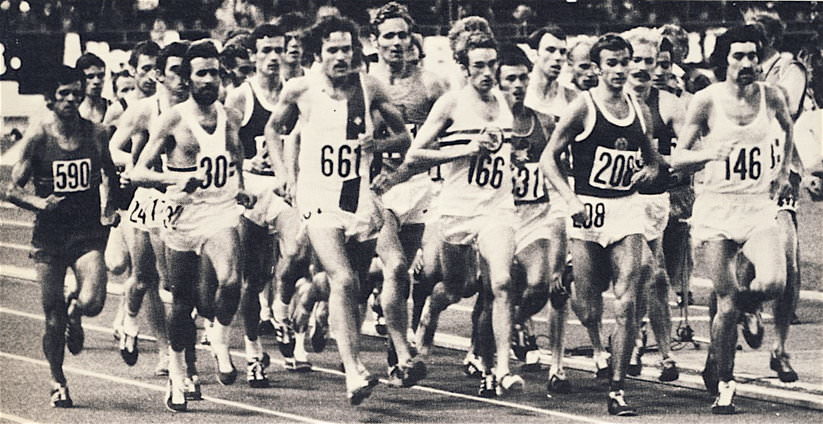1971 European Championships
August 10-15 Helsinki, Finland
The Finnish people had waited a long time for another Paavo Nurmi to raise their patriotic spirits. The flamboyant 5,000/10,000 double of Juha Vaatainen was thus hugely appreciated, especially since the location was the Finnish capital. He was head and shoulders above anyone else as the star of the meet for the running events.
800
There were two outstanding athletes in this event: the returning champion Dieter Fromm from East Germany and Russian Yvgeniy Arzhanov, who had been undefeated in 33 races since his fourth-place finish behind Fromm in the 1969 Euros. These two runners were the same age, having been born within one day of each other in April 1948.
 |
| Arzhanov has a clear margin over Fromm and Carter. |
Arzhanov waited in pack during the first lap as British hopeful Andy Carter led at bell in a fast 51.4. The pace then slowed; the next 200 was covered in 27.0 with the reigning 800 champion Dieter Fromm leading into the final turn. As if demonstrating his superiority over the German, Arzhanov overtook Fromm on the bend and then held on down the final stretch for a 0.4 victory margin. He had covered the last lap in 54.2 and the last 200 in 27.2. Fromm kept close to the Russian, but at the end he had to fight hard to keep his second place as Carter got very close to him by the finish.
The top three all ran PBs. Arzhanov won his only major championship in this race. For Carter, this was his only medal in a major games. Ohlert (19) was impressive for a junior. Plachy, injury prone was a disappointing 6th. He had been second in this race in 1969.
1. Yevgeniy Arzhanov USSR 1:45.6; 2. Dieter Fromm EG 1:46.0; 3. Andy Carter GBR 1:46.2 ; 4. Hans-Henning Ohlert EG 1:46.9; 5. Browne GBR 1:47.0; 6. Plachy CZE 1:47.3.
1,500
Italian Francesco Arese came into this final with the fastest time of year: 3:36.3 (in finishing second to Liquori). The very experienced Henryk Szordykowski, who was third in the last Euros in Athens, was another favorite for the gold. The Finnish crowd also had a runner to cheer for—a young and relatively unknown Pekka Vasala. Before the race, an Italian-British agreement between Arese and Brendan Foster ensured that the pace was fast. “I wanted it to be a final for the best runners, not the best sprinters,” Foster told Neil Allen (Times, August 16, 1971)
 |
| Arese leads at the bell. Kirkbride, Foster and Vasala follow. Boxberger is seventh (left). |
Arese agreed to take the first lap. And he led the field through 400 in 57.1, after which Foster took over, passing 800 in 1:58.7 and 1,000 in 2:29.5. Arese was back in the lead at the bell (2:44.4) with Kirkbride, Foster and Vasala leading the field close behind. Round the next curve Szordykowski was boxed in and had to take drastic measures to escape. By the end of the back straight he was in second, close behind Arese and just ahead of the two Brits, Kirkbride and Foster. The order stayed the same round the curve, but coming into the straight, Arese took one look at Szordykowski on his shoulder and accelerated. It was now a two-man race for the gold, while Kirkbride in third tried to hold off Foster and Boxberger.
Szordykowski was able to match Arese’s final effort, but perhaps because of the energy he had used to escape the box on the penultimate bend, he couldn’t find the little extra needed to pass the Italian. Behind Szordykowski there was a very tight race for third, with Foster just managing to pass his team-mate in the last meters. Boxberger finished fast and just failed to catch Kirkbride.
Arese showed courage in winning from the front, and he perhaps had a little left at the end. His medal was the first Italian Euro gold in the running events since Beccali’s win in 1934. Szordykowski duplicated his 1969 silver medal, but he must have been cursing himself for getting boxed in. Both Foster and Kirkbride ran PBs and were close to the British record of 3:39.0. Vasala, who would be Olympic 1,500 champion the following year, was 9th in 3:41.5.
1. Francesco Arese ITA 3:38.4; 2. Henryk Szordykowski POL 3:38.7; 3. Brendan Foster GBR 3:39.2; 4. John Kirkbride GBR 3:39.5; 5. Boxberger FRA 3:39.6; 6. Dufresne FRA 3:40.7.
5,000
After Juha Vaatainen’s incredible final lap in the 10,000, few people doubted that this race would give him a double. Haase, his main rival in the 10,000, was not running, so the main opposition to the Finn came from two veterans, Frenchman Jean Wadoux and West German Harald Norpoth. Wadoux (29), who had played second fiddle to Michel Jazy for several years, had a record of poor performances at major meets. His best was 13:28, which he had run the previous year. Norpoth (29) had a better record at major meets and a good finish, but he had yet to win a major title. He had the best PB coming into the race: 13:24.8 run in 1966. Vaatainen, on the other hand, had run only 13:43.2 in 1970. “I went into the race with no technical plans, just to beat Wadoux and Norpoth,” he said later. (Track and Field News, 1970)
 |
| Vaitanen nears the tape, while Wadoux (142) and Norpoth fightfor second place. Dane Korica is fourth. |
No one really challenged Vaatainen in the final. There was no Bedford to make the pace fast, and there were no breakaway attempts. Alvarez of Spain did most of the leading, but nothing really happened until the last 300 when Vaatainen took off, just as he had done in the 10,000. This time there was no Haase to give him a race. Wadoux and Norpoth did give chase and were still close with 200 to go. Wadoux held on for most of the curve, but as Vaatainen came into the straight, he was moving away. Norpoth moved up to Wadoux and then ahead, but at 50m he looked across at the Frenchman and then seemed to ease off, letting Wadoux come back for the silver.
After the wonderful 10,000, this was a disappointing race. But all credit to Vaatainen, who looked unbeatable in these games. Also notable was the only other runner to run both distance races, Dane Korica. He managed to hold off Salgado and Puttemans for fourth place, the same position he had earned in the 10,000.
1. Juha Vaatainen FIN 13:32.8; 2. Jean Wadoux FRA 13:33.6; 3. Harald Norpoth WG 13:33.6; 4. Dane Korica YUG 13:35.0; 5. Salgado SPA 13:35.8; 6. Emil Puttemans BEL 13:36.6.
10,000
Juha Vaatainen certainly captured the hearts of the Finnish people, who had high hopes that he would repeat the last Finnish triumph by Heino in 1946. The 30-year-old mutton-chopped Finn possessed a devastating finish and was rumoured to be in racing shape, despite his ulcer and achilles problems. But he would have to stay with the new front-running sensation from Britain. Dave Bedford (21) had appeared on the international scene in 1969 when he ran a UK record for 10,000 (28:24.0). In 1970 he lowered the record to 28:06.2 and then less than three weeks before the games, he ran a Euro record with 27:47. This time made him half a minute faster than anyone else in the race. But not to be overlooked was Jurgen Haase; the 26-year-old East German had won the previous two Euro titles and had a PB of 28:04. Basically the race would test Bedford’s ability to run away from the field. If he failed it would then be a question of who had the better kick, Vaatainen or Haase.
 |
| Dave Bedford leads the large field in the early stages. Fromm (208) and Tuominenfollow. Gaston Roelants (30) and Mariano Haro (590) are on the outside. |
Twenty runners started in front of a capacity crowd. The early bunching of the large field left Vaatainen with two spike wounds. Bedford was soon in the lead, testing the field after just one lap. He then took the field through kilometers in 2:43:2 and 2:43.4, injecting surges. But then he slowed to 2:48.4, and had five runners breathing down his neck at 3,000 (8:15.0):Haase, Sharafyetdinov, Korica, Haro and Vaatainen. Something wasn’t right with Bedford. He wasn’t showing his usual aggressiveness. Later Bedford admitted he was struggling: “The surges…were ineffective and I was really having to fight even to keep making progress.” (Bedford, 51) Vaatainen took the lead for a brief period, but it was Bedford leading most of the time. He even opened up a small gap in the fifth K, but Haase quickly closed this gap. Bedford was in front at halfway: “The 5,000 meters time of 13:54.4 was the death-knell for me as I knew if I couldn’t go through in 13:40 then my chances were limited.” (David Bedford, as Told to James Coote, p.51).
 |
| Approaching the bell, Bedford is shadowed by Vaatainen and Fromm (blue vests).Inside are Haro and Korica, both in red. |
After surges by the two Finns, Vaatainen and Tuominen, Bedford dropped back. But the pace made the leaders slow, and Bedford was back in the lead after 7K (19:34). Mariano Haro took the lead, with four laps to go (23:37). Down the back straight, when Haro opened up a small lead on the field. Vaatainen, who had been shadowing Bedford for most of the race, nipped past him to stay with Haro. Soon Haase was past Bedford too. But Bedford still had hopes of breaking the lead group, and coming into the straight with just over three laps to go, he accelerated back into the lead. The same group were together at 9K (25:18), and Bedford was still pushing the pace in the lead. But by the time he reached the bell, the Englishman knew his goose was cooked; there was no way he was going to outkick the people behind him. At the bell Vaatainen was on Bedford’s shoulder and Haase on Vaatainen’s. The struggle between the Finn and the German on the last lap has become part of running legend. Haase was regarded as perhaps the fastest 10,000 finisher of all time, but Vaaitainen had been a 400 runner who had once been a 400 finalist in the Finnish championships.
 |
| 300 to go: Fromm has moved up on the outside, and Vaatainen is about to react. |
Coming out of the penultimate bend Haase made his move outside Bedford and Vaatainen. However, Vaatainen was ready for him and the two raced neck and neck down the back straight until Vaatainen got the lead into the last bend. Haase wasn’t by any means defeated. He kept the Finn close round the bend and then pulled out and accelerated into the straight. Vaatainen was in full flight, but the speedy German made inroads on his lead. With about 60m to go, Haase was almost beside Vaatainen. At this moment the Finn looked sideways at his challenger and then reacted immediately by finding another gear. Soon after this Haase realized that he couldn’t win and eased up a fraction.
 |
| 60m to go: Vaatainen looks across at Fromm. |
The victorious Finn had run the last lap is an amazing 53.8, which was faster than the last lap of the 800 final. His margin of victory was 0.6 of a second. In third was the Russian Sharafyetdinov, who had actually been dropped with one K to go. The first five made history: it was the first time ever that more than one person had beaten 28:00 in a 10,000 race. These five owed a lot for the fast times to sixth-place finisher Dave Bedford. To show the high standard of this race, Bedford’s time of 28:04.4 was the eleventh fastest ever for 10,000.
1. Juha Vaatainen FIN 27:52.8; 2. Jurgen Haase EG 27:53.4; 3. Rashid Sharafyetdinov USSR 27:56.4; 4. Dane Korica YUG 27:58.4; 5. Mariano Haro SPA 27:59.4; 6. Dave Bedford GBR 28:04.4
Marathon
In the rain, two Belgians, Lismont and Roelants, made the early pace. While Roelants was extremely experienced not only as a cross-country runner and steeplechaser but also as a marathoner, Lismont was running in just his third marathon and hadn’t yet clocked under 2:15. Eventually Britain’s Trevor Wight caught the two leaders. The trio passed 25K about 70m ahead of two more Brits, Ron Hill and Colin Kirkham. Soon after this, Roelants made a move on a downhill stretch and opened up a small 30m gap. But his attempt to break away was over at 34K when Lismont and Wright overtook him.
Lismont, the initiator of the attack on Roelants, was soon out on his own. The Belgian went on to a comfortable 50-second win and a PB. Behind him Wright and Hill took the other medal places, Hill having passed Roelants well before the finish. This was the first big win in Lismont’s prestigious Marathon career. Earlier in the games he had clocked another PB in the 10,000 with 28:31.2 in 16th place. 
1. Karel Lismont BEL 2:13:09; 2. Trevor Wright GBR 2:13:59.6; 3. Ron Hill GBR 2:14:34.8; 4. Colin Kirkham GBR 2:16:22; 5. Gaston Roelants BEL 2:17:48.8; 6. P. Rummakko FIN 2:17:58.8.
1 Comment